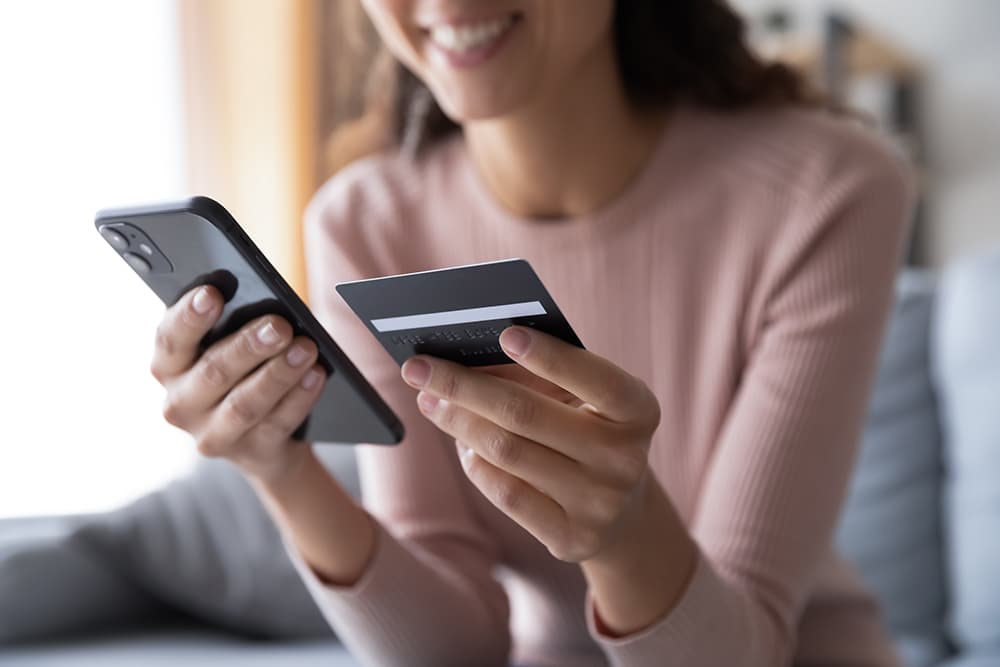Why your ecommerce store should be ready to accept phone payments.

Without the ability to process online payments, an ecommerce business simply could not exist. Having said that, whether you’re a new merchant with no experience accepting payments, or you’re simply upgrading the equipment you already have, the array of choices before you can be dizzying.
Fortunately, we’re here to help you navigate the phone payments maze, including one way for your customers to make purchases that you may not have known about at all.
Online payments behind the scenes.
On the surface, ecommerce transactions look simple. Your customer picks their products, selects the way they want to pay, provides their credentials, and simply waits for approval from the bank that issued their card.
On the back end, however, there are several interconnected players including: your merchant account, a payment gateway, a payment provider, and a payment processor. These separate entities work together through the use of various online technologies to ensure a payment process that is safe and secure for both you and your customers.
All this while simultaneously delivering a fast, convenient, and seamless overall shopping experience that keeps customers coming back again and again. Never forget: One of the best ways to get repeat business is to give your customers the option to pay using their method of choice.
Credit and debit cards.
Whether they reside in North America, Asia, or Europe, credit cards and debit cards have become the preferred method of choice for consumers, with other parts of the world quickly jumping on the bandwagon as well.
All modern ecommerce platforms easily integrate into payment gateways and shopping cart software that allow customers to select and order their items of choice using secure credit and debit cards.
Bank transfers.
Any customer who uses an internet bank can buy products using this method. They simply contact the online financial institution for authentication, approval, and submission of payment.
This method is quite secure since every transaction must adhere to rigid PCI compliance standards.
Prepaid cards.
Similar to standard credit cards in most respects, these cards are preloaded with a set amount. Prepaid cards are frequently used by young consumers who have not yet been approved for a standard credit card.
Using these cards ensures that a customer will never go over their purchase limit. It also guarantees that payments will not be declined on the basis of insufficient funds. An added bonus? Prepaid cards are also commonly given as gifts around the holiday season.
Direct deposits.
Increasingly common, direct deposits allow money to be withdrawn on a regular basis from a customer’s bank account – with their permission. Daycare centers, gyms, and weight loss companies have been embracing this model for a long time.
Now, other merchants are coming to realize the benefits of offering direct deposit payments. These benefits include fewer delinquent payments, better cash flow, and smoother relationships with customers since the financial schedule is clear and consistent.
Accepting customer payments over the phone.
Particularly in our current coronavirus era when contactless options are more important than ever, retailers are increasingly augmenting their payment acceptance to include orders taken over the phone.
In many cases, doing so can boost sales and increase buyer satisfaction, thus promoting repeat business, as well as word-of-mouth referrals.
There are several ways to conduct these types of card-not-present transactions:
- Manually keying in the customer’s credit card number, CVV, and expiration date into your point of sale (POS) system.
- Typing that same customer payment information into your mobile credit card app.
- Using a virtual terminal (a web-based credit card processing application that acts as your physical POS system). Virtual terminals may contain additional authentication features allowing you to more thoroughly verify the identity of the customer, and secure a lower processing rate.
Because the buyer’s physical card is not available for inspection by the merchant during phone orders, phone payments are generally considered to be of higher risk to the payment processor. As a result, you can expect to pay slightly more for the privilege of conducting these transactions.
As you evaluate your next steps, you’ll want to ask yourself if the benefits of facilitating customers’ purchases over the phone outweigh the higher costs you can expect to incur.
As we have discussed, payment processors recognize the increased risks that come with card-not-present payments conducted over the phone. You should make every effort to do so as well. Minimize the chances of becoming a victim of fraud by doing the following:
- Take the time to get complete customer information. This should include the customer’s full name as it appears on their card, as well as the card number, CVV code, expiration date, and full mailing address, including zip code.
- Track the delivery of all products sent to customers who paid by phone. This assists you in verifying the legitimacy of the transaction and can prevent chargebacks, which can prove costly to any merchant’s business.
Business owners are constantly juggling the need to make a profit with the equally important task of providing their customers as many seamless and secure ways of paying as possible. One of the best ways to decide which options to offer is to assess your buyers’ demographics, purchase preferences, and habits, as well as the limits of the technology you currently have in place.
After making your evaluation, you may decide that it makes sense to upgrade your systems and expand the scope of the payment options you wish to offer.
When you provide customers with easy and safe ways to purchase your products and/or services, your profits will go up and so will their satisfaction and loyalty. In summation, the flexibility offered by phone payments represents a win-win for everyone involved.























